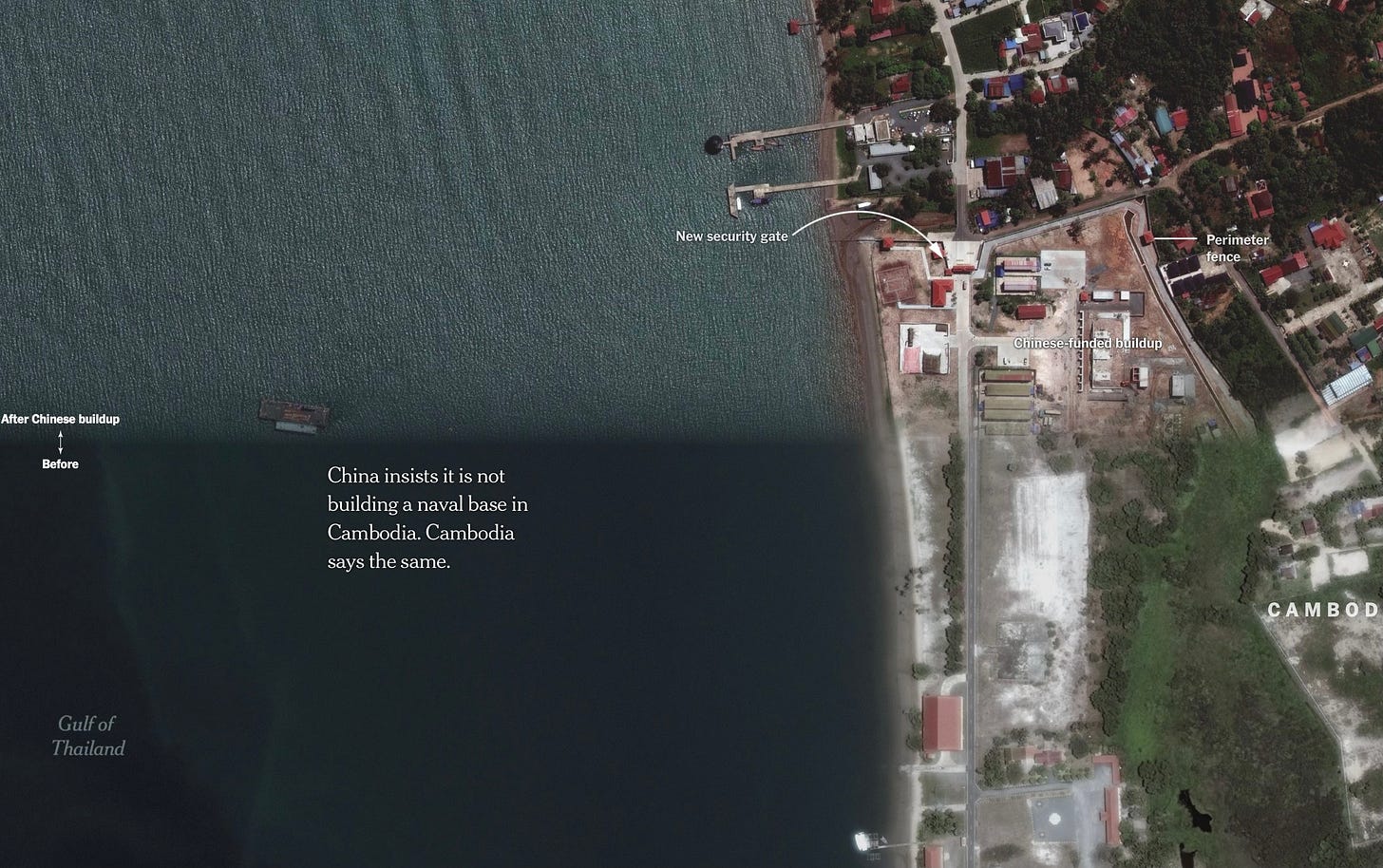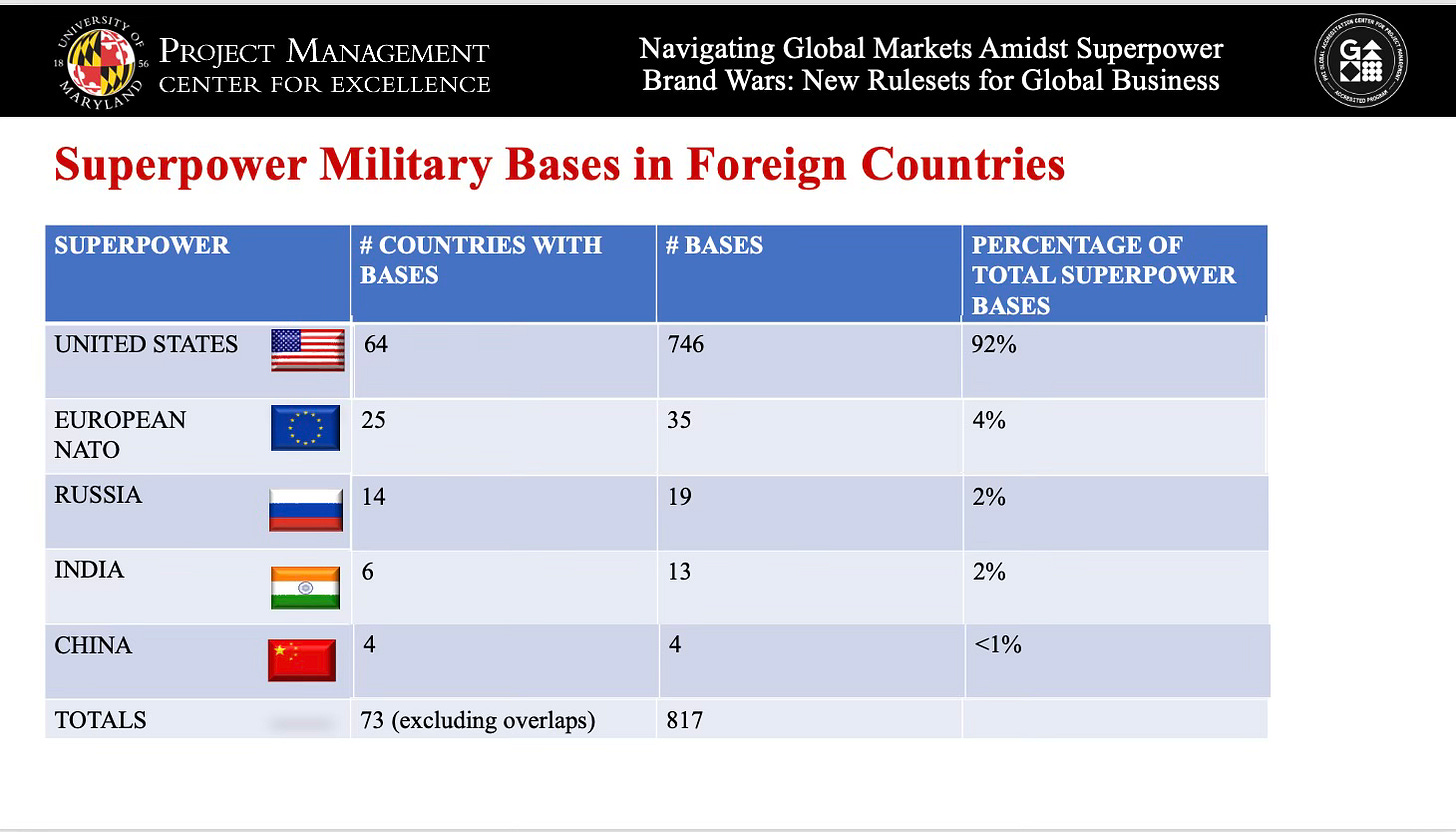1) The first one bites the dust
CNN: Rising seas wiped out an entire US species for the first time. Scientists say it’s a sign of things to come
I will admit that I love, and am fascinated by, cacti.
So, distressed I was to learn of the first US species to go extinct because of climate change — here, rising seas.
A unique plant has become the first species in the United States to be exterminated from the wild by the compounding effects of rising seas, scientists say. It’s a grim first, but not last, as the scientists fear the demise of the plant is a “bellwether” for other species as the climate crisis tightens its grip.
The combined effects of sea level rise, rising tides and intense storms drove the wild Key Largo tree cactus population to extinction in its only known US location in the Florida Keys, according to the paper published this week in the Journal of the Botanical Research Institute of Texas.
Saddest thing: we only discovered this cactus in 1992.
Remember, we are living through the Sixth Mass Extinction period in planetary history — and it’s all because of us.
America is the greatest and the scariest nation in the history of the world. Our form of globalization — first within these United States and then across the planet — has forever altered Earth.
THAT is serious power, and with it comes GREAT RESPONSIBILITY, yes?
2) AI —> UBI
GUARDIAN: Money for nothing: is universal basic income about to transform society?
Odd image of choice to laud the inevitability that is Universal Basic Income (UBI), in my opinion.
Still, I love hearing about UBI experiments because I think they are the future with all this AI and robots and automation. This idea that we work and we work and then we die is depressing, right? Especially when so many of us live in such tension and fear over the ever-present danger of taking an economic tumble into poverty.
People, dare I say, shouldn’t have to live like that.
With a UBI, you can gear shift whenever you want or need to in your life, to include taking time off to be a caregiver — often the most agonizing and meaningful choice one can make in this world. Then there’s retooling for a new career. Or moving to where the action is. All of these choices are made more realistically flexible in a world of UBI. Plus, you can take all that self-esteem-crushing bureaucratic welfare government stuff and throw it in the trash in favor of a streamlined UBI system.
To me, it’s all about re-establishing dignity in a very FDR-like way. We’re just in a form of capitalism today that is far too brutal for too many of us. So yeah, I’m in favor of UBI because I like the idea of living in THAT society — less judgmental, more generous, more of everybody feeling like their personal pursuit of happiness is real and protected. Dare I say a kinder, gentler society.
How’s this for a Founding Fathers’ pedigree?
The concept of a guaranteed basic income might seem novel or neoteric, but it dates back to 1795, when the American founding father Thomas Paine suggested a “national fund” should pay every adult “rich or poor” a “ground rent” of £10 a year until the age of 50. Earth is “the common property of the human race”, he argued, so everyone has been collectively dispossessed by “the introduction of the system of landed property” and was entitled to compensation.
If you truly believe in “forgotten” people, this is a good answer.
The broad framing here is clear:
“We are seeing the most disruptive force in history,” Tesla founder and X (formerly Twitter) owner Elon Musk said last year, before speculating: “There will come a point where no job is needed – you can have a job if you want one for personal satisfaction – but AI will do everything.”
Now, Musk gets his timelines screwed up all the time, but the direction and the destination seem clear enough, even as we can always argue rate of travel.
In March, after analysing 22,000 tasks in the UK economy, covering every type of job, a model created by the Institute for Public Policy Research predicted that 59% of tasks currently done by humans – particularly women and young people – could be affected by AI in the next three to five years. In the worst-case scenario, this would trigger a “jobs apocalypse” where eight million people lose their jobs in the UK alone.
People are going to work and create and serve; that’s just who we are. This isn’t about that, or even the drive to innovate and conquer. Those instincts are not going away.
This is just an argument about compensation — far more broadly framed.
I want people happy, secure, creative, energetic, and so on. If AI brings us Karl Marx’s superabundance to an overwhelming degree, then we need to start thinking about the post-work paradise on the far side of that tipping point.
So, bring it on! I say.
You want conservative values? A focus on the family? These are legit goals legitimately served by a UBI, which is as Christ-like as it comes in its Golden Rule logic.
3) It’s good to be the king
BBC: Is Brazil's Brics-building worth it?
Article ostensively about whether it’s worthwhile for Lula to push the BRICS agenda, but it’s just as much about what a lopsided power structure the BRICs has always been.
Basically, the counter-argument is that the BRICS is a suck-up-to-Beijing gathering.
Talk about the medium as the message:
It's come to be known as Brics Plus, after the original members agreed at a watershed summit in Johannesburg in August last year to admit a handful of new joiners, including Saudi Arabia and Iran.
Not bad for a grouping that was originally willed into being by sheer high-concept financial whimsy, the brainchild of economist Jim O'Neill, who saw it more as an investment opportunity than a new gang of nations.
An asset class that becomes a world-spanning … something or other.
Still, the future seems bright, for, as Lula himself notes:
“We have already surpassed the G7 and account for 32% of global GDP in purchasing power parity.”
But who’s the “we” here?
Jim O’Neill, now apparently a “baron” for his wealth, points out that the “I” and “C” basically account for all the growth right now. As such:
China "dominates the Brics by being twice the size of all the others combined", in much the same way that the US dominates the G7.
The article gets to the real truth of the matter at the end:
As a result, Brazil has now acquired "a China dependency" that could harm it in other foreign policy relations, she says.
"If you are in the US, you know that the US stance on China is not going to change [whoever wins the presidential election in November]," [Monica de Bolle at the Peterson Institute] adds.
"In either case, it's moving in the direction of greater anti-China sentiment. At some point, that's going to create additional reactions from China, which could put Brazil in a very difficult position, because it's perceived as being aligned with China."
Stunning when you contemplate it: China with more pull in Brazil than the US.
Get used to it, America, or outperform the Chinese.
4) America deeply resembles that remark!
FOREIGN AFFAIRS: For the Rest of the World, the U.S. President Has Always Been Above the Law
This is a brilliant piece that reminds us of the always useful tactic of viewing a US development from outside the US.
Regarding the recent SCOTUS decision on presidential immunity:
What most analysts have failed to note, however, is that this lack of legal accountability for decisions by the U.S. president, including decisions to direct the military to use lethal force, is nothing new. It has long been the reality for most of the world outside the United States. For decades, American presidents have waged illegal wars, plotted to assassinate foreign leaders, unlawfully detained and tortured people, toppled democratic governments, and supported repressive regimes without any possibility of legal accountability in either domestic or international courts.
Although people all over the world have suffered from these unlawful acts, Americans have lived in a bubble—a bubble this Court decision has finally burst. Indeed, what is so frightening about this decision is that it has the potential to make the president’s actions within the United States just as unchecked as they are outside it.
Major ouch!
Puts the whole Seal Team Six scenario in a new light, yes?
As I have noted for years and within America’s New Map, we have modeled certain behaviors for years and now their example, embraced by rising and risen powers, rebounds upon us and frightens us:
An awkward legacy of Obama’s GWOT [Global War on Terror] makeover was his vigorous embrace of select killings of high-value targets—those enemies our government most wants dead. By doing so, America established precedents that competing great powers now readily exploit. Consider Putin’s targeted killings of Russian émigrés and defectors, Israel’s assassinations of senior Iranian government officials, and Saudi Arabia’s murdering of regime critics such as the journalist Jamal Khashoggi. China’s maximally preemptive targeting of its restive Muslim Uighurs elevates this approach to an industrial scale, to include forced abortions and sterilizations (per Terminator logic, there is no need to assassinate the rebel leader never born).

We Americans must live with our choices — to include possibly putting that dangerous man back in the White House. But the wider world may not actually see all that much of a difference.
5) Rare my ass!
WSJ: Rare-Earth Prices Are in the Doldrums. China Wants to Keep Them That Way.
The naked truth:
The U.S. and Europe would love to cut their dependence on China for rare earths. Standing in the way of that ambition are low prices and Beijing’s willingness to throw its weight around to keep the market down.
Rare earths are not that rare or that restricted to China.
They’re just godawful to mine in terms of environmental costs. The Chinese are willing to do it, and so they control a strong majority of production (85%). They protect that dominant share through generous government subsidies to the industry.
In sum, this is not a hardened situation: America and/or other great powers can reduce any such dependencies on China if they choose to spend the money and make the nasty effort.
6) If I could put wheat in a bottle
GUARDIAN: ‘Goldmine’ collection of wheat from 100 years ago may help feed the world, scientists say
You have to love this callback:
A hundred years ago, the plant scientist Arthur Watkins launched a remarkable project. He began collecting samples of wheat from all over the globe, nagging consuls and business agents across the British empire and beyond to supply him with grain from local markets.
His persistence was exceptional and, a century later, it is about to reap dramatic results. A UK-Chinese collaboration has sequenced the DNA of all the 827 kinds of wheat, assembled by Watkins, that have been nurtured at the John Innes Centre near Norwich for most of the past century.
In doing so, scientists have created a genetic goldmine by pinpointing previously unknown genes that are now being used to create hardy varieties with improved yields that could help feed Earth’s swelling population.
Now, scientists are finding all sorts of solutions for this and that local agricultural challenge, such as soil too salty here or lack of nitrogen-based fertilizer there.
Here’s the weird bit that suggests all our farming over the centuries has narrowed down our access to Mother Nature’s riches:
Astonishingly, this data revealed that modern wheat varieties only make use of 40% of the genetic diversity found in the collection.
Remember that whenever you discuss the strength of a society: genetic diversity wins.
7) Just a little to your left. Your other left!
WAPO: Satellites could be put to work tracking ocean trash
I referenced this example in America’s New Map:
A glimpse of this future: America’s National Geospatial-Intelligence Agency (NGA)—a Department of Defense combat support element—increasingly fielding requests from the Federal Emergency Management Agency (FEMA) to divert their powerful satellite-based reconnaissance systems from monitoring, for example, North Korean nuclear sites to locating hurricane victims. That repurposing of defense assets to security purposes will become commonplace as climate change’s system-shaping impact supersedes the dynamics of superpower military rivalries. In the end, defense is necessary but insufficient to winning this global competition for affiliation, the outcome of which will be measured in member states accrued—the geopolitics of belonging.
Here, we see satellites being used to map giant plastic blobs floating in the deep ocean.
Satellites can now track ocean garbage from space, marking a potential “game changer” for tracking the vexing problem of marine litter, new research suggests.
The study, published in Nature Communications, suggests that even satellites that haven’t been specially designed to detect floating trash may be useful in the battle against a rising tide of ocean pollution.
It gets better:
The researchers propose that future satellite missions include litter-specific tracking devices. More accurate plastic tracking capabilities could also improve ship navigation, search-and-rescue operations or lost cargo searches, they write.
It’s all part of the larger shift from zero-sum defense to non-zero-sum security.
8) Cambodia gets a second opinion
NYT: The Chinese Base That Isn’t There
The gist:
In 2020, something curious happened at Cambodia’s Ream military base, on the Gulf of Thailand.
Not long after submitting — and then abruptly withdrawing — a request for the U.S. Defense Department to refurbish parts of the base, Cambodian officials proceeded to demolish the American-funded buildings that were already there, some only four years old.
Then the Chinese got to work.
Naturally, China building a naval base near an incredibly important shipping lane, upon which so much of its economy depends, is inherently suspicious!
What do you mean you don’t want to trust all your shipping to the US Navy? What’s up with that?
Per a slide I created for my follow-on MOOC (massive open online course) to the ANM-derived MOOC:
When it comes to bases around the world, we’re doing okay at 92% of the total, including the vast majority in East Asia (almost 300 separate facilities even as China seeks this first one in Cambodia).
In fact, as the world’s second biggest economy (per standard GDP, #1 in PPP-measured GDP), doesn’t it make sense to let China take some of the global policing role, or do we think we’re the only great power committed to stable sea traffic?
9) Peak humanity
USA TODAY: World population projected to peak at 10.3 billion in 2080s, new United Nations report says
OUR WORLD IN DATA: Peak global population and other key findings from the 2024 UN World Population Prospects
Some minor excitement, given all these prevalent depopulation fears in the Global North, about the latest UN revision to its rest-of-the-century projection on global population.
But, honestly, the numbers have been very steady for quite some time now: for years I’ve been briefing a topping-out of world population around 2075 with the peak falling between 10 and 11B.
The big wildcard out there is the biotech revolution and its co-mingling with the Technological Singularity. If life-extension takes off in a big way, then we’re far more likely to see a plateauing of humanity versus any anticipated drop-off.
Simply put, between AI and demographic transitions, we’re going to run out of jobs long before we run out of people.
10) When Big Mother knows you’re ovulating
SCMP: China’s population crisis demands ‘dynamic monitoring’ of households, more support: adviser
The scary lede:
To keep better apprised of population and household changes and trends across China during its dim demographic crisis, Beijing has been urged to establish a vast data-monitoring system and brace for population declines becoming the norm.
“China’s population and family statistics system and dynamic monitoring mechanisms should be improved, with increased financial and personnel support,” said He Dan, director of the China Population and Development Research Centre, a think tank affiliated with the National Health Commission.
Here comes the handmaid’s app.
11) Retirement towns
WAPO: ‘Too many old people’: A rural Pa. town reckons with population loss
And on the other side of the age pyramid …
Lee Goldthwaite might have the most stable job in this remote corner of northwestern Pennsylvania.
The caretaker of Sheffield Cemetery is busier than ever directing crews clearing trees to make space for more graves as deaths dramatically outpace births here and in other vast stretches of rural America. Each time he buries a newly deceased resident he wonders how the town that once drew scores of young families will survive.
“We already lost our bank,” Goldthwaite said as he took a break from trimming the grass around headstones. “We lost our liquor store, and we may be about to lose our high school.”
Four-fifths of US counties are in the same boat right now: more deaths than births.
Maybe we could use a bit more immigration? A national UBI?
12) Short selling climate change
BOSTON GLOBE: Assessed at nearly $2 million, Nantucket waterfront home sells for just $200,000. ‘Inevitably the ocean will win.’
The picture says it all.


















